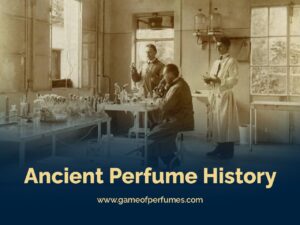Discover the Ancient Perfume History Twist on Scent

Do you remember the Qyburn in Game of Thrones, the web series? We consider them as a Scientist in Game of thrones but do you know who was the scientist of Game of Perfumes? So, let’s dive into the Ancient Perfume History to find the perfume inventor.
An inspiring female scientist named Tapputi, the remarkable narrative of Tapputi Perfume has a fascinating history that stretches back to the second millennium BC.
Talking about an era in Ancient Perfume History when a trailblazing woman inventor created the first scents! The Ancient Perfume History was revealed by the discovery of stories about Tapputi, the product’s creator, on a clay tablet from Mesopotamia.
Aromatic legacy: Fragrances and perfumes have been treasured and used in fascinating ways by many cultures throughout history, leaving us spellbound even now. Come explore the changing cultural significance of scents as we take you on a fragrant journey through time to Ancient Perfume History.
Ancient Egyptian Perfume
Step into the world of ancient Egypt to know the Ancient Perfume History, where fragrance was prized and revered in high society. Can you imagine a time where the god Nefertem was hailed as the ruler of perfume? Picture this: water lilies, a common element in the perfumes of that era, were often held by Nefertem himself.
In Ancient Perfume History of Egypt, non-scented oils were used to distill natural substances, creating a delightful array of fruity, flowery, and woodsy perfumes. These captivating scents weren’t just for personal use—they held ceremonial significance and played a pivotal role in Egypt’s trade relations with other nations, particularly through the trade of incense and myrrh.
Now, let’s talk about the glamorous Queen Cleopatra and the formidable Queen Hatshepsut. Legends have it that these iconic rulers used perfumes to not only adorn their bodies and bathe in, but also to enrich the atmosphere of their final resting places—yes, even their tombs were scented!
The allure of ancient Egyptian perfumery is undeniable. Join me on this journey through history as we uncover the scented secrets of these legendary rulers and the captivating world of fragrance in ancient Egypt.
Ancient Persian Perfume
Explore the Ancient Perfume History of aromatic kingdom, ancient Persia, where Perfumes were not merely a luxury but a way of life.
The ancient Persians held an enchanting obsession with perfume, ruling the trade for centuries and even pioneering non-oil-based perfumes. During the Sassanid period, the production of fragrance and infused waters flourished, weaving a fragrant tapestry throughout the Persian empire.
In Persian noble society, perfume held an esteemed position, with kings boasting their own exclusive “signature scents” off-limits to companions and relatives. King Persepolis Darius was often depicted with his treasured bottles of perfume and incense, while King Xerxes was associated with the delicate Lily of the Valley flower, a popular ingredient in the era’s fragrances.
Not only did the Persians adore perfumes, but they were also innovators, with abundant perfume-making equipment and fragrance-making workshops dotting ancient Persia. Their love for experimentation led them to explore a myriad of scents and pioneering distillation processes, leaving an aromatic legacy that transcends millennia.
Ancient Roman Perfume
Travel back in time to Ancient Perfume History days of Greece and Rome, when creating perfumes was a craft. The detailed documentation of these civilizations’ methods resulted in the modern replication of Greco-Roman scents.
Did you know that perfumes were an essential part of Rome’s growth and were employed in religious rituals? Romans brought in copious supplies of scents, which they used in personal care goods and bath houses.
Despite its widespread use, some people disapproved of scents’ excess, including Pliny the Elder. Such indulgences were outlawed in Europe for centuries following the fall of Rome. Come along on an olfactory tour of Ancient Perfume History through time as we explore the fascinating world of vintage scents.
Ancient Indian and Chinese Perfumes
The appealing smells of perfumes have woven themselves into the fabric of human history, attracting people from different nations. While Europeans may have temporarily shunned fragrances, other cultures were passionate supporters of their fragrant delights.
Perfumes played a vital role in Tantric ceremonies in ancient India, lending a sensory element to the proceedings and filling hallowed temples with the alluring aromas of their creations. In the meantime, scent found expression in the most unlikely settings in Ancient Perfume History of China.
Daily objects like writing ink and stationery that had words written on them were infused with perfume. The Chinese even used perfume to purify and eradicate illness from their surroundings because they believed in its cleansing properties.
When the Silk Road developed into a pathway for the interchange of ideas, aristocrats in China during the Sui and Song dynasties started bringing in ingredients for their own perfumes, creating a luxurious scent that the Yuan, Ming, and Qing dynasties eventually brought down to the common people. Oriental scents were distinguished by their fragrant use of herbs and spices, many of which were also essential ingredients in cooking and medicine.
Conclusion;
This fascinating historical voyage of Ancient Perfume History demonstrates how scents were used in ancient communities all throughout the world as sensory, spiritual, and cultural objects in addition to body ornaments. Come with us as we explore the historical journey of aroma that has forever changed how people perceive scent.

2 thoughts on “Discover the Ancient Perfume History Twist on Scent”